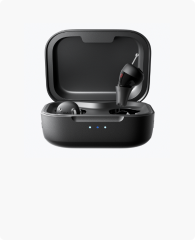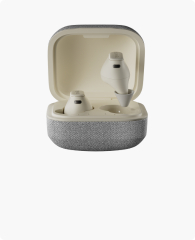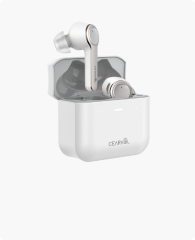Let's be honest—shopping for hearing aids isn't anyone's idea of a good time. But if you or a loved one are starting to struggle with hearing loss, it's a conversation that can't wait. And with the recent rise of over-the-counter hearing aids (OTC hearing aids), there's a whole new set of choices on the table.
So, what's the deal with OTC hearing aids vs prescription hearing aids? Are they really that different? And which one gives you the best value for your money and your hearing health?
🚀 Navigate This Post
- ➤ Part 1: Understanding Hearing Loss and Hearing Aids
- ➤ Part 2: The Best OTC Hearing Aids - The New Kid on the Block
- ➤ Part 3: Prescription Hearing Aids: The Traditional Route
- ➤ Part 4: OTC vs. Prescription: Which is Right for You?
- ➤ Part 5: OTC vs Prescription Hearing Aids: The Key Differences
- ➤ Frequently Asked Questions
You may also be interested in:
- Comprehensive Guide: Everything You Need to Know about Hearing Aids
- 7 Great Tips for First Time Hearing Aid Users
- Hearing and Balance - Wobbly Walk? It Might Not Be Your Legs Problem
Part 1: Understanding Hearing Loss and Hearing Aids
First things first, let's talk about hearing loss. Simply put, it happens when your ears aren't working as well as they used to. Hearing loss can come on slowly over time or appear suddenly, and it can affect people of all ages—even if you think it only happens to older adults.
Hearing aids are devices that amplify sound, helping you hear better. Traditionally, you needed a prescription to get them. But now, thanks to some pretty cool advancements, you can get the best OTC hearing aids right off the shelf.
Part 2: The Best OTC Hearing Aids - The New Kid on the Block
OTC hearing aids are changing the way people approach hearing care. They are usually more affordable, easier to get, and provide strong amplification compared to traditional devices. It's similar to buying glasses online instead of going in for a full eye exam. Many top OTC hearing aid brands also offer free online hearing tests, making it simpler than ever to find the right fit.

Pros of OTC Hearing Aids
- Affordability: Let's face it, healthcare can be expensive. OTC hearing aids are generally much cheaper than their prescription counterparts.
- Convenience: No appointments, no waiting. You can order them online and have them shipped right to your door.
- Self-adjustment: Many OTC hearing aids come with apps that let you tweak the settings to your liking.
Cons of OTC Hearing Aids
- Limited features: While they've come a long way, OTC hearing aids might not have all the bells and whistles of prescription ones.
- Fit issues: Getting the right fit can be tricky without a professional.
Part 3: Prescription Hearing Aids: The Traditional Route
Prescription hearing aids are the tried-and-true method. You'll need to see an audiologist to get a hearing test and then get fitted for your specific hearing loss.

Pros of Prescription Hearing Aids
- Custom fit: Your hearing aids will be molded to your ear for maximum comfort and sound quality.
- Advanced technology: Prescription hearing aids often have more features and can be adjusted to your specific hearing needs.
- Professional guidance: You'll have an audiologist to help you with everything from fitting to troubleshooting.
Cons of Prescription Hearing Aids
- Cost: Prescription hearing aids can be quite expensive, even with insurance.
- Time-consuming: Getting fitted for hearing aids can be a lengthy process.
- Overfitting: Sometimes, audiologists can be overly enthusiastic about adjusting your hearing aids , which can lead to an unnatural sound.
Part 4: OTC vs. Prescription: Which is Right for You?
So, which one should you choose? It depends on a few factors:
- Severity of hearing loss: Mild to moderate hearing loss can often be addressed with OTC hearing aids. For more severe hearing loss, a prescription might be necessary.
- Budget: If cost is a major concern, OTC hearing aids are the way to go.
- Desire for professional guidance: If you want a hands-on approach and personalized care, a prescription might be better.
It's also worth noting that technology is constantly improving. The gap between OTC and prescription hearing aids is narrowing, and we can expect to see even more options in the future.
Part 5: OTC vs Prescription Hearing Aids: The Key Differences
| Feature | OTC Hearing Aids | Prescription Hearing Aids |
|---|---|---|
| Accessibility | Buy online or in-store | Requires audiologist visit |
| Price | Usually $200–$1,000 | Often $2,000–$6,000 per pair |
| Customization | Self-fitting or pre-programmed | Tailored by a professional |
| Best for | Mild to moderate hearing loss | Moderate to severe hearing loss |
| Support | Limited or remote support | Full in-person care |
As you can see, when comparing OTC vs prescription hearing aids, the main differences come down to cost, convenience, and customization.
Cearvol®: Your Partner in Hearing Health
At Cearvol®, we're committed to providing affordable, high-quality hearing solutions. We believe everyone deserves to hear their best, regardless of budget. Our team of experts is dedicated to helping you find the best OTC hearing aids for your needs.
Choosing between prescription vs OTC hearing aids comes down to your individual needs, budget, and comfort level with self-service tech.
 Newcomer Price
Newcomer Price
Wave Lite - Best OTC Hearing Aids with Bluetooth
- ✔ 40dB Gain
- ✔ Bluetooth + AUX-IN
- ✔ AI 2.0 Noise Control
- ✔ App-Controlled
- ✔ 15-Min Fast Charge
Tip: Works well for everyday conversations, calls, and TV listening.
So, there you have it. The world of hearing aids can be confusing, but hopefully, this guide has shed some light on the topic. Remember, the best hearing aid for you is the one that works best for your lifestyle and budget.
Do you have any questions about OTC or prescription hearing aids? Let us know in the comments below!








Leave a comment
All comments are moderated before being published.
This site is protected by hCaptcha and the hCaptcha Privacy Policy and Terms of Service apply.